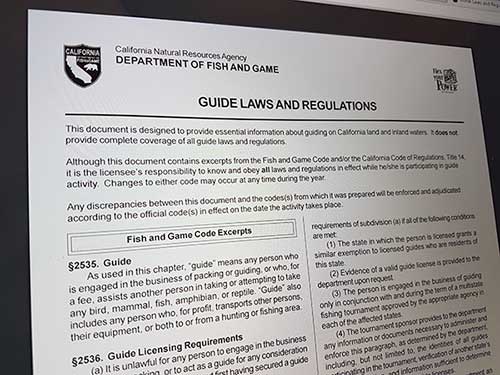
Share this infographic on your site
(Select the image width and copy the code below it)
Width: 600 pixels
Width: 1200 pixels
How to Become a Hunting Guide Introduction
There is an inexplicable sense of freedom that comes from being out in nature. It’s something that many of us only get to experience infrequently and only during those treasured annual hunting seasons.
For many, hunting season is a time when life is experienced in a way that is both exhilarating and deeply satisfying, appealing to an older and more primitive side of ourselves that is lost in the fast-paced world of modern living.
This is part of what makes becoming a hunting guide such an attractive job. It allows you to devote your time to the things that matter most to you, to making a living in a manner that places you intimately in your place in the world.
It’s a job that lets you take your hunting and bushcraft skills and truly let them shine. You get to share that sense of wonder that comes in viewing remote parts of nature and hunting the animals that live there with others -while still being able to pay the bills.
To help you transform that dream into reality, we’ve put together a guide filled with everything you need to know about how to becoming a hunting guide. From legal requirements to training, to attracting customers, we try to address all the important factors you’ll need to consider.
Requirements to Be a Hunting Guide
One of the first things you’ll need to determine if wondering how to become a professional hunting guide is which requirements there are to being a hunting guide in your specific area. This is something that varies state by state. Some states require nothing more than that you possess a valid hunting license. Other states, especially out west where elk hunting is big business, may require you to complete a hunting guide training program, to possess a hunting guide license, to belong to certain hunting guide organizations, and to possess Red Cross certification in first aid and CPR. You may also need to register with the state, which may very well entail paying a fee.
To find out exactly what requirements you need to meet, contact the wildlife department for your state. A quick internet search (or our state-by-state resource page) will turn up their website where you should be able to identify what legal requirements your state has and how to get a hunting guide license, if necessary. If you can’t find the information on the website, there will be contact information for the right people to talk to to find out for sure what, if any, requirements there are. Unfortunately, there really isn’t an easier way than that, as legal hunting guide requirements do vary so much across the country.
Once you’ve fulfilled any necessary requirements for your state and are ready to go into business for yourself, there will be additional legal requirements that go hand in hand with running your own business. We’ll take an in-depth look at those requirements below in the Becoming your own Boss section.
Of course, there are some personal requirements that make becoming a hunting guide easier and help to determine if this truly is a good profession for you. As much as a love of hunting and respect for nature are critical in this line of work, it’s also important that you like people. This is something that is easily overlooked, but as a professional hunting guide, your job is all about taking care of your clients and making sure that they have an enjoyable and memorable experience. Your clients are the heart of your business. They pay your bills and keep you in business. Your clients do important word-of-mouth advertising for you, telling everyone they know how the hunting guide for their big hunting trip made the hunt amazing -or awful. We’ll take a further look at keeping your clients happy in the Becoming your own Boss section.
Training to Become a Professional Hunting Guide
As mentioned previously, training to become a hunting guide may follow different requirements based on where you live. Some states may require you to complete some sort of training with a hunting guide school while others may place the burden of ensuring you’re a competent and knowledgeable hunting guide squarely on your own shoulders.
Independent Study
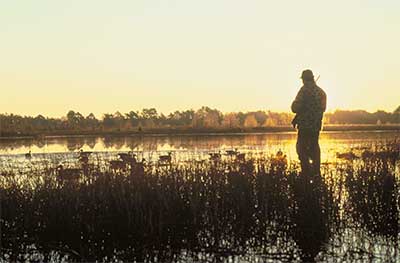
For states which have no specific training requirements, how you learn to be a hunting guide is entirely up to you. The foundation of your training should be based on actual hunting experience and on being outdoors for extended periods of time.
These are a few skills you want to be sure you’re well versed in:
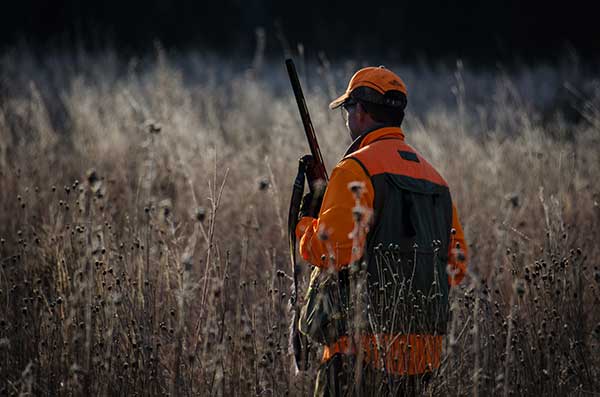
It’s also a great idea to spend time with some of the old timers in your area. See if you can go hunting with them. These men are a treasured resource, filled with the history of the land, one-of-a-kind techniques for hunting in your micro-environment, as well as some great local hunting stories that you can share with your clients during dull moments or around the campfire as you eat.
It also never hurts to be on good terms with other local hunters who may tell their friends and contacts about you and your services as a hunting guide.
To pick up extra knowledge tips, it also doesn’t hurt to take a turn as a customer and hire a local guide. Pay attention and soak up as much as you can. This is a great opportunity to learn local tips and strategies, and it helps you to build connections.
You could also work for a local hunting guide in whatever position you can get. Even working as a camp cook or wrangler for a season will teach you valuable things on how to be a hunting guide. Remember, other hunting guides aren’t your competition so much as a resource. We’ll explore that idea further in the section Becoming your own Boss.
Hunting Guide Schools
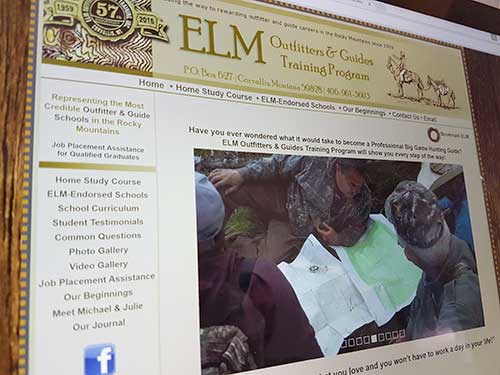
There are a number of hunting guide schools that exist throughout the US. The first hunting guide school opened in 1959 and was created by Erv Malnarich in Corvallis, MT. This hunting guide school is still in operation and endorses several others. It truly set the standard, and their program is comprehensive, covering all of the topics mentioned in the independent study section above, as well as the legal components of being a hunting guide and business basics. This course begins with a home study program followed by a four-week intensive training at one of their endorsed schools.
Other hunting guide schools do exist, with varying levels of quality. It’s important to keep in mind that there is no national accreditation body to evaluate and accredit schools. This explains why there is no standard in duration (some schools run as short as five days) and why with some schools it seems more like you’re paying them for the opportunity to work for them. For this reason, you need to select a hunting guide school carefully. Peruse their website and go over every last bit of information available. Reputable schools will discuss their program and will have a number of pictures of previous graduates. Testimonials from graduates are helpful, but keep in mind that a school isn’t likely to share a negative review they got.
A good school should cover all aspects of game care and hunting, stress the importance of attitude and behaving ethically, what you can and cannot do as a professional, and how to be a guide and not a hunting companion for your clients.
Prices also vary between schools, but you should expect to pay at least $2000. That may seem like a lot of money, but once you’ve completed your training, you’ll have the tools to start a profitable business that gives you the freedom to live your life in the way you’ve always dreamed.
Note: Consumer files is not endorsed or sponsored by any hunting guide school.
Hunting Guide Jobs
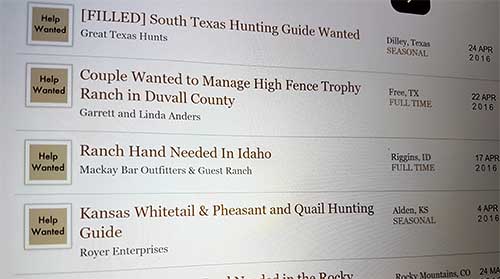
Most hunting guide schools will provide you with valuable job leads as part of completing their program. While that may translate to a position as a camp cook, wrangler, or as the one who sets up and tears down camp with a local outfitter or larger hunting guide operation, this can be a valuable experience that teaches you the ins and outs of the industry and what being a hunting guide truly entails.
Depending on where you live and will be working, the hunting guide jobs available to you can differ significantly. Out west, where there are greater legal requirements, you have opportunities to work as a guide as part of a hunting outfitter operation, and, as aforementioned, there are always the many other positions offered by an outfitter.
However, most hunting guides work independently, going into business for themselves. This allows them greater control over their rates and what they make, as well as what clients they work with.
Hunting Guide Salary
The mean average hunting guide salary in 2015 was about $40,000 -with a brand new guide who is working on creating a client base (and, therefore, working more part time) making about $11,000. Most hunting guides make about $100 a day but may make extra from tips. Of course, rates will vary based on location and demand, so what a hunting guide leading week long expeditions tracking elk in the Rockies makes may differ considerably from a guide leading a week long expedition for whitetail in the northern Midwest. But, given current data, once established you can expect to make between $20,000 and $90,000. Of course, your expenses are pretty low when working, so you’ll be able to bank quite a bit of that, too.
Becoming your own Boss

Most hunting guides work as independent hunting guides, not associated with other hunting guides or hunting outfitters. That means they operate as a small business -with all the legal necessities that such entails. Owning your own business is a very satisfying venture, but in the hunting guide industry there are a few differences when it comes to conducting business. For example, we mentioned earlier about how other local guides aren’t competition so much as an invaluable resource. Making connections and forming good relationships with established local hunting guides can literally make your business that first year. Established guides run the risk of finding themselves overbooked come hunting season, and rather than risking the bad PR of canceling reservations, they may refer clients to you to save face and keep their client happy. This is an opportunity for you to pick up some work and gain some good word of mouth advertising from a happy first-time customer. Of course, remember to return the favor to that other hunting guide if you ever find yourself in a similar position.
Legal Requirements
As with any business, there are certain legal requirements that you need to satisfy in order to conduct business. Obvious ones include attaining all necessary licenses, belonging to state registries, and paying taxes on the money you make.
NOTE: Being on the state registry is a great way to attract clients as it’s not uncommon for people to consult state registries to find a hunting guide. Belonging to any hunting guide organizations is also a great idea, whether it’s required for your state or not. It’s a way to make connections and stay on top of any changes in legislature or legal requirements for your area. Belonging to larger organizations also adds an air of legitimacy to your business, as it implies having to meet certain requirements (which may or may not exist in your state and may mean little more than paying a yearly fee to that organization. But your client doesn’t know that.)
There are other requirements, too, that need to be factored in, such as insurance and incorporating your business. You may very likely be fine as a Limited Liability Company (LLC) with basic liability insurance. But, if you have a larger operation, you may find that comprehensive coverage is in your best interest as it can help to cover damage to vehicles. You may also find you need an office space as a place to meet with clients if working out of your home isn’t an option. That comes with its own overhead charges, with rent and utilities important considerations.
As part of operating a sound and ethical business, you also need to ensure that your clients are meeting all necessary legal requirements. That means making sure your client has all necessary licenses and permits so that they can legally hunt where you will be taking them hunting. It may seem like that’s something that should be your client’s concern, but you don’t want to be known as the hunting guide whose client took down an elk and yet wasn’t even legally allowed to carry a gun.
Basic Business Expenses
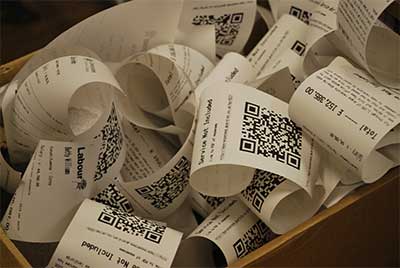
We’ve already discussed some of the big financial expenses to get your business off the ground and keep it operational. They include licensing and registration, insurance, incorporating your business, and paying taxes. But depending on the size and scope of your operation, there are a few other expenses that you may need to take into consideration.
One such thing is transportation. Not only do you have to worry about how you’ll get your client to where you’ll be hunting (horses? ATV’s? walk?) but you may need to provide transportation for them to get to your base camp in the first place. Not all airports and hotels provide transportation, so your client may have no way to get to you unless you pick them up.
All of this also means that you need to keep scrupulous records of your clients and all money coming in and going out. Don’t underestimate the importance of record-keeping! A basic computer with a spreadsheet to keep track of clients, a calendar to help keep scheduling clear, and a simple finance program to keep track of income and expenses are incredibly beneficial. Not only does it make tax time that much easier, but it also helps you to maintain contact with previous clients (who are always potential repeat customers) and to avoid the embarrassment of overbooking clients.
Figuring out What to Charge
As with any profession, when first starting out you need to be willing to provide your services at a reduced rate compared to the local average to better attract a client base. Once you’ve established yourself as a competent guide with a returning client base and good word-of-mouth advertising, you can raise your rates to reflect the average local rates.
With that in mind, there are some important things to consider when figuring out what to charge your clients. As mentioned above, what other local guides are charging in your area is one of the most important things to consider when determining your rate. If you’re charging considerably more than other guides, you run the risk of alienating potential clients. But if your rates are considerably less than the average rate, then customers may assume that the quality of service you’re offering isn’t there and that you’re not as good as someone who charges more.
You also need to take into consideration what exactly your service entails, as you do need to meet your business expenses as well as turn a profit (in laymen’s terms, profit means whether or not you get to eat or make repairs to your pickup truck). If you provide transportation to and from your client’s hotel, then that service should be reflected in your rate. If expeditions are a week long excursion in the wilderness with fire cooked meals, then that, too, needs to be reflected in what you charge your customers.
Attracting Customers
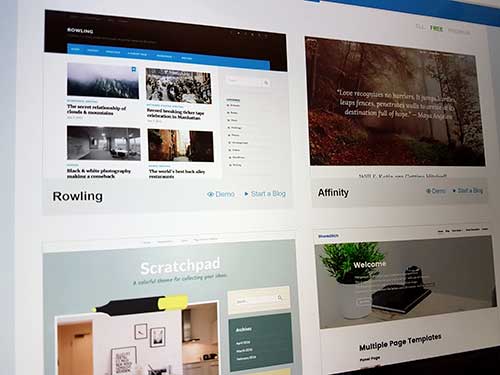
When it comes to marketing and getting your name out there, it can be as simple or as complicated as you want it to be. Regardless of how you market yourself, however, it must be effective. In this day and age, if you have any sort of business then you must have a website. There are a number of free web hosts available that allow you to create an easy to navigate website that you customize and build without any knowledge of website building. A quick search of “free web hosting” should bring up dozens of options (one very popular, and user friendly, platform is WordPress.com). Of course, you can also pay to have a professional looking website built for your, but that will cost you.
No matter which route you choose, a website for your business is crucial in attracting new customers. The internet is very much an integral part of most people’s lives, and most people will turn to the internet to find information about businesses and services more than any other method. For that reason, it’s also important to be sure your website is mobile optimized, meaning that it’s usable and looks great on smartphones and tablet computers.
What should your website consist of?
If you’re internet savvy, you may even consider creating a social media account to share stories and pictures, hunting tips and facts, and attract customers from across the country. Certain social media platforms, such as Google+, also serve an important function of boosting your ranking in search results. And a Facebook Page can help you to reach potentially thousands of customers across the country.
While it may seem a little outdated, business cards are still an important part of doing business. Your business cards should have your name, hunting guide license number, specialty, and multiple ways to contact you -including your website. These cards are great to pass out to people who seem interested in your services because, after all, as a small business owner, you will naturally be telling everyone you know about what you do and how great you are at it. You can also check with related area businesses and see if you can leave a stack of business cards or a flyer near a check out for interested people to pick up.
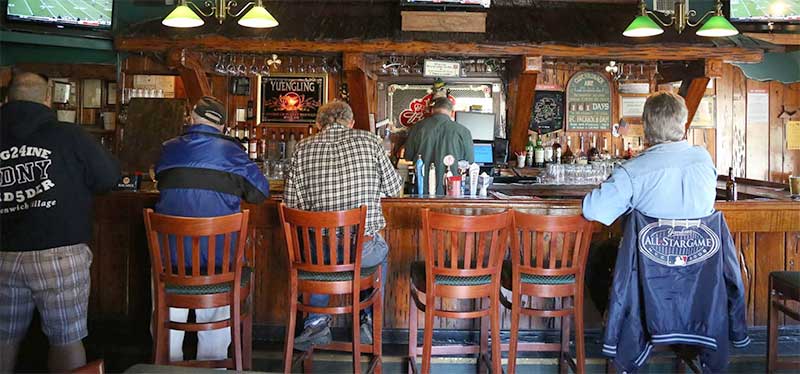
Speaking of checking out local businesses, it’s beneficial to be on good terms with local bar owners, managers of resorts and hotels, and hunting supply stores. They often get inquiries about local hunting guides looking to book in advance. Being on good terms with these people and ensuring that they have your contact info is a good way to guarantee that they’ll recommend you to prospective clients.
Placing an advertisement in local and regional hunting magazines is a great idea way to get your name in front of people who are looking for the services you have to offer.
Of course, you want to remember that every client is a potential repeat customer. This is why keeping your clients happy and staying on good terms with them is so important. To better your chances of landing a repeat customer, stay in touch with previous clients. You could send them a postcard at the holidays thanking them for their business and maybe offering a discount on early booking for next hunting season. You could also put together an email newsletter that shares updates, interesting information, and highlights upcoming hunting seasons. This keeps your clients interested in your services and allows you to continue to provide them value.
Keeping your Clients Happy
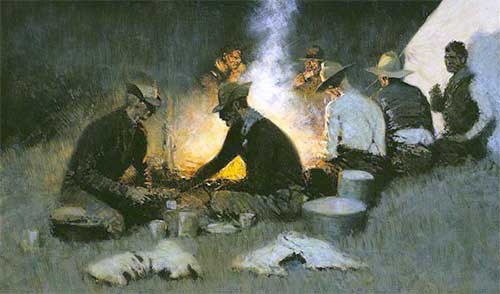
Your client is the heart of your business. Yeah, we said that earlier but this fact is so important that it bears repeating. When in your care, it is your job to make sure that your client has an unforgettable experience, that they’re safe, and that they are enjoying themselves as much as possible. We touched on this earlier, in how familiarizing yourself with local plants and animals can help make the trip more interesting. And having a great hunting story -especially one that took place where you’re hunting- can help spice up a dull moment or make for a great story to share around that end of the hunt campfire.
Not only is a happy customer likely to hire you again, but they’re likely to recommend you to everyone they know. So going that extra mile to deliver a high level of service and to be considerate of your client’s needs really can’t be overstated.
Another way to help keep your client happy and comfortable on the hunting trip is to make sure you have a few essentials on you. These items are easy to forget if you only offer day trips and won’t be camping in the wilderness with your client. A first aid kit, rain gear, and insect repellent should be standard in your gear as should be basic equipment to repair guns. It’s also a good idea to have water, snacks (in addition to emergency food in case of a worst case scenario), and toilet paper (the plainer the better as it’s more biodegradable).
That attention to detail and thinking of your client’s needs before they are aware of them is one of the hallmarks of great customer service and may be the determining factor on whether or not that client considers the hunting trip a success -regardless of whether or not they landed that trophy buck or bull elk.
Final Considerations
There are a lot of benefits to becoming a hunting guide, especially since the market demand continues to be high for competent professionals. However, it’s important to remember that, like any profession, this job does have some drawbacks. There’s a high possibility of burn out as the job is very physically demanding. It’s nothing to lose ten pounds on a week-long hunting trip simply because it’s difficult to get enough calories to match the amount of work you’re doing. You’ll be getting up early to prepare for the day’s hunt, feeding the pack animals, setting up and tearing down camp, cutting wood, clearing trails, all on top of carrying a 30+ pound pack as you travel up and down the countryside with a very likely complaining client.
But being a hunting guide is a job like no other. It really makes you aware of who you are and what you’re capable of, and in a world where convenience and instant gratification are the standards, that kind of self-knowledge brings its own rewards… found in few other places.
